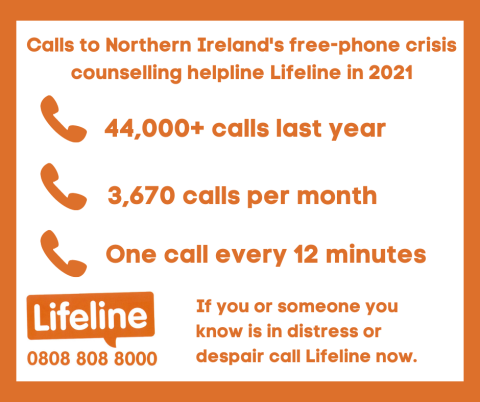More than 44,000 calls to crisis counselling service

Lifeline, Northern Ireland’s free-phone crisis counselling helpline, received over 44,000 calls in 2021, with approximately 3,670 calls per month - an average of one call to Lifeline every 12 minutes last year.
Lifeline is the regional crisis intervention service that supports people experiencing distress or despair and is available for people of all ages, 24 hours a day, 365 days a year, where all the calls are answered by qualified crisis counsellors.
Over the past year, the top three issues that people called the Lifeline service for support for included experiencing thoughts of suicide, also known as suicidal ideation, those with high levels of anxiety and those needing support in relation to feelings of low mood and depression.
John Hand, Lifeline Service Manager, said, “Many people in our community continue to deal with the stress and challenges brought on by the impact of the COVID-19 pandemic, this along with other stressful life events can compound feelings of despair. People may be feeling overwhelmed and cannot, for whatever reason, speak to a family member or friend, Lifeline counsellors are at the end of the phone day and night to support everyone.
“Our counsellors are trained in wide range of issues, from relationship breakdown, abuse, self-harm, addiction-related issues, to name a few. They will listen, support, or signpost to appropriate community and voluntary organisations that can help. Lifeline can also offer short-term counselling if required and agree follow-up calls for a limited time to check in on people to see how they are coping.”
The service receives numerous compliments and testimonials from people every day this has included feedback from callers such as: “Lifeline has helped me to cope with some very difficult life circumstances”. Another caller said: “Thank you for being there at my lowest time”. Another said: “As a man I was reluctant to get help but I’m so glad I did”.
John added: “Lifeline also accepts calls on behalf of someone in distress who can’t make that first call for themselves. For example, Lifeline counsellors can help a friend or family member to support the person in distress. Healthcare workers including GPs also regularly refer people to Lifeline."
Fiona Teague, Mental Health and Emotional Wellbeing lead at the Public Health Agency, which commissions the regional service said, “The Lifeline service and its experienced crisis counsellors are invaluable to our communities. The service has been taking calls throughout the pandemic, available day and night when many services were not as readily available due to COVID-19 restrictions. Lifeline counsellors were able to adapt their face-to face counselling service by offering regular telephone counselling appointments. They supported hundreds of people through whatever crisis they were experiencing at that time, to help get them to a better and safer place.”
John added, “Although the highest number of calls to Lifeline relate to people experiencing suicidal thoughts, Lifeline is also there to offer early intervention support to people before they reach that crisis point in their lives.
“As we begin another year, many people are setting goals to improve their physical wellbeing, in Lifeline we also want to promote the importance of setting goals to help mental wellbeing. Lifeline counsellors often offer stress management advice and would encourage people to try and incorporate the ‘Five Steps to Wellbeing’ into their daily routine to help them cope better and be enhance their mental wellbeing. This encourages people to Connect, Be active, Take Notice, Keep Learning, and to Give.
“We like to say that at Lifeline we offer the right support at the right time – anytime.”
If you or someone you know is in distress or despair and needs support they can contact Lifeline free on 0808 808 8000.
For mental and emotional wellbeing, self-help tips and support information visit www.mindingyourhead.info
